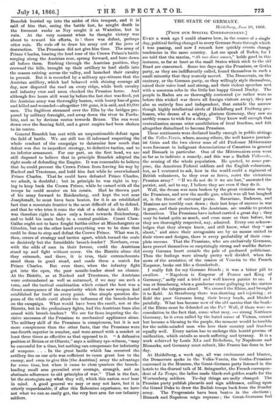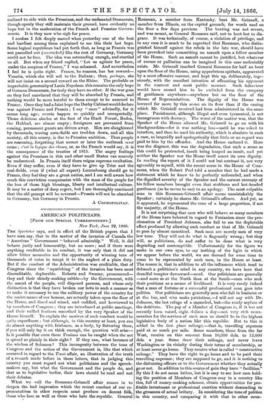THE STATE OF GERMANY.
Heidelberg, June 10, 1866. [FROM OUR SPECIAL CORRESPONDENT.]
EVEN a week ago I could observe how, in the course of a single day, political feeling changed in every German State through which I was passing, and now I remark how quickly events change tendencies in the same country. Let me speak of Baden, for I am told that the maxim, "Ab uno dime omnes," holds good in this instance, as far at least as the small States which stick to the old Bund are concerned. Some ten days ago the Prussians, or Gotha party, as they are indifferently called, found themselves in such a small minority that they scarcely moved. The Democrats, on the contrary, or the German party, as they willingly style themselves, raised their voice loud and strong, and their violent speeches met with a sonorous echo in the little but happy Grand Duchy. The people in Baden are so thoroughly contented (or rather were so before this wicked war drove all foreign visitors away), they are also so entirely free and independent, that outside the narrow though highly intellectual circle of Heidelberg and Freiburg pro- fessors, who dream of a mighty, glorious Germany, they saw no earthly reason to wish for a change. They know well enough that centralization means utter annihilation of local freedom, and felt altogether disinclined to become Prussians.
These sentiments were declared loudly enough in public sittings of the Yolks- Verei n, where, among others, the well known journal- ist Griin and the two clever sons of old Professor Mittermaier were foremost in indignant denunciations of Cassarism in general and Bismark in particular. One of the Mittermaiers even went so far as to indicate a remedy, and this was a Badish Volksinehr, the arming of the whole population. He quoted, to some pur- pose, the American Federal soldiers and the English volunteers, but, as I ventured to ask, how in the world could a regiment of British volunteers, be they ever so fierce, resist the victorious Prussian army? "If we do not do it we are lost," answered the patriot, and, sad to say, I believe they are even if they do it.
Well, the dream was soon broken by the great victories won by the Prussian; and now the needle gun, which was all but laughed at, is the theme of universal praise. Bavarians, Badenses, and Hessians are terribly cast down ; their last hope of success in war is gone, and their protectors, the Austrians, are unable to protect. themselves. The Prussians have indeed carried a great day ; they may be hated quite as much, and even more so than before, but they are thoroughly respected, nay, admired. Every one acknow- ledges that they always knew, and still know, what they "ate about," and since their antagonists are by no means united in their views and designs, there is every probability of their com- plete success. That the Prussians, who are exclusively Germans, have proved themselves so surprisingly strong and warlike flatters every German heart outside the pale of professed politicians. Thus the feelings were already pretty well divided, when the news of the armistice, of the cession of Venetia to the French Emperor, broke out like a thunderbolt.
I really felt for my German friends ; it was a bitter pill to swallow. "Napoleon is Emperor of France and King of Germany," sadly said a tried and well known patriot to me. I was at Strasbourg, when a gendarme came galloping to the station and read the telegram aloud. We crossed the Rhine, and brought it to Kehl. At Strasbourg there was shouting and rejoicing ; at Kehl the poor Germans hung their heavy heads, and blushed painfully. What has become now of the old maxim that the bank of the Rhine must be defended on the Po? Vell, if there were no consolation in the fact that, come what may, one strong Northern Germany, be it even called by the hated name of Vienna, cannot but become a blessing to the people, the moment would be terrible for the noble-minded men who love their country and freedom equally well. Every nation has to undergo this horrid process of unification, which entails so much suffering and tyranny. It is a work achieved by Louis )(La and Richelieus, by Napoleons and Bismarks, and Germany must submit, like France has done in her day.
At Heidelberg, a week ago, all was excitement and bluster, the Democrats spoke in the Volks-Verein, the Gotha-Prussians conversed in the Museum, the Great-German party listened in the hotels to the diurnal talk of M. Seinguerlet, the French correspon- dent of Le Temps, the ladies made black-red-golden scarfs for the Wurtemberg soldiers. To-day things are sadly changed. The Prussian party publish placards and sign addresses, calling upon the Grand Duke to draw the Baclish troops back from the Bunder army. The Progressists have been beaten in the elections ; Bismark and Napoleon reign supreme ; the Great-Germans feel inclined to side with the Prussians, and the undaunted Democrats, though openly they still maintain their ground, have evidently no hope but in the moderation of the French and Prussian Govern- ments. It is they now who sigh for peace.
I confess I felt deeply moved when yesterday one of the best and hardiest among them explained to me this their last hope. Some logical republican had put forth that, as long as Prussia was not parcelled out (zerstlickelt) like the rest of Germany, Germany could not be free. The idea was astounding enough, and startled us all. But when my friend replied, "Let us agitate for peace, under the auspices of France," I was ashamed. And nevertheless I feel he is quite right. France, he reasons, has her reward— Venetia, which she will sell to the Italians ; thus, perhaps, she will not insist on a second reward on the Rhine. The probable or improbable generosityof Louis Napoleon, this remains the only hope of German Democrats, for truly they have no other. If the war goes on they feel convinced that they will be absorbed by Prussia, and nothing would be more hateful to them except to be annexed to France. Once they had a faint hope the Derby Cabinet woulddeclare war against France and Prussia ; I say " once " advisedly, for it seems long ago ; events happen so quickly and unexpectedly. Those delicious abodes at the foot of the Black Forest, Baden, the Hubbad, are almost empty ; foreigners are prevented from coming, permanent guests are driven away. Men are slaughtered by thousands, waving corn-fields are trodden down, and all this anxiety, all this misery, is due to Prussian ambition. Thus people are reasoning, forgetting that sooner or later the outbreak must come ; c'est la logique des chases, or, as the French would say, it is the consequence of the treaties of 1815. The angry feelings against the Prussians in this and other small States can scarcely be understood. In Prussia itself there reigns supreme exultation. Even if they suffer, even if they have to give up Trier and the coal-fields, even if (what all expect) Luxembourg should go to France, they feel they are a great nation, and I am well aware how much this conviction compensates with the mass of the people for the loss of those high blessings, liberty and intellectual culture. It may be a matter of deep regret, but I am thoroughly convinced that the old precept will be reversed—Prussia will not be absorbed































 Previous page
Previous page